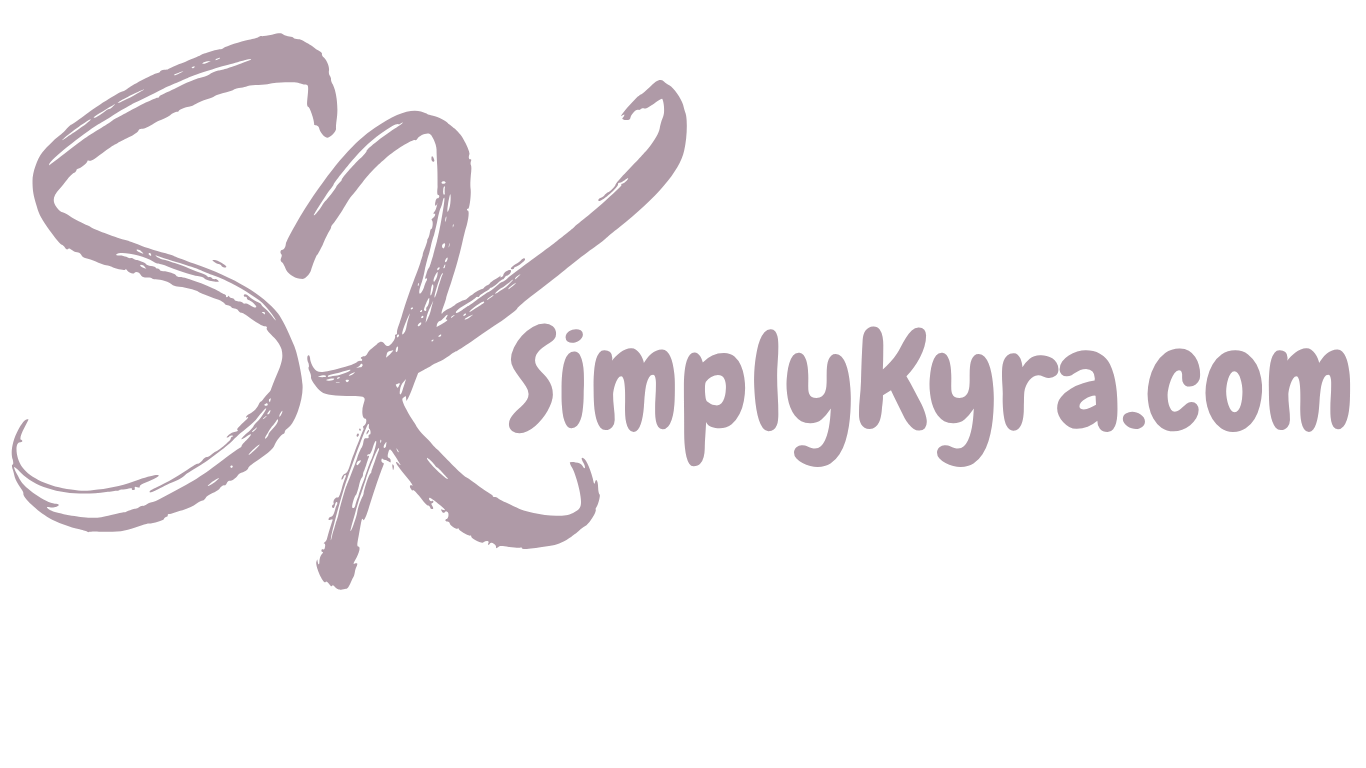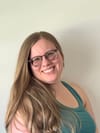
My Daughters’ Mask Command Center and How I Made It
Life felt weird as school approached this year especially since my eldest has been doing school remotely since the pandemic began and my second is about to start kindergarten. I started worrying about how many masks the kids might need each day, how often they’d need to be washed, and finally how to carry the masks back and forth. Both kids only have four masks each that they currently like wearing so I decided I needed to make more and set them up with the best system I could think of so their masks routine would be straightforward and easy. This is what I came up with which I wanted to share with you in case it may also help you too.
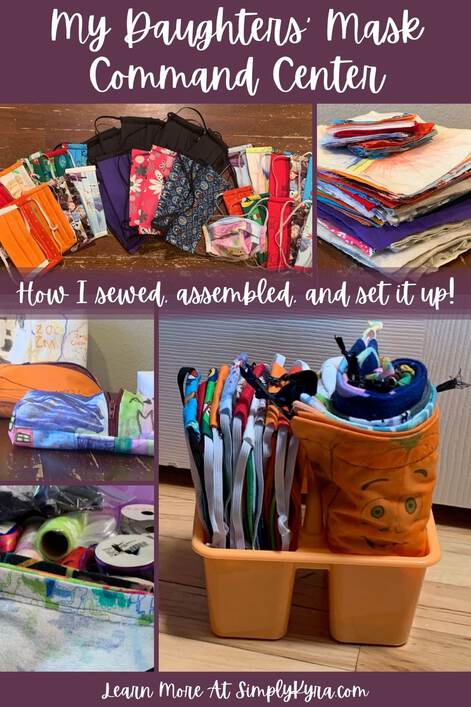
Planning
I knew going into this that I was going to make the Iris Luckhaus masks as my family loves each of the masks I’ve made with that pattern. Before starting; however, I knew I needed to decide what system I wanted the kids to use while they were at school. I knew they’d need to be able to bring several clean masks so they could easily change into a fresh one when the first mask is wet or dirty. That suggested I needed to have a bag or pouch in each backpack to hold the clean masks and another bag or pouch to hold the used ones. I also realized that the kids could reuse the clean mask bag or pouch over several days while the bag or pouch holding the dirty masks would need to be washed more often. As such I’d need to have way more dirty mask bags, as they’d be thrown into the laundry bin at the end of each day, than clean mask bags. This fact alone made me realize that I wanted to use a more secure pouch for the clean masks as I wanted to be sure that the masks stay clean in the bag which suggested, to me, a zippered pouch. Before Ada started school back in kindergarten I found a free pattern on Crazy Little Projects for a zippered pencil pouch that I knew would make a perfect clean mask bag as the zippered opening would help keep the masks secured and clean in the backpack. Next I needed to figure out a bag for the dirty masks. I knew I wanted a simpler pattern to hold the dirty masks as I definitely didn’t want to sew tons of zippers and I wasn’t sure how well they’d hold up after many washings. Back in 2020 I’d used a free Made for Mermaids pattern for a cinch bag that folded into a mat. I realized a cinch bag would be perfect but I wanted one even simpler than that so I looked online and found one by Pam Ash Designs that looked perfect for what I wanted. With the sewing patterns decided it was now time to figure out the count I needed and get them made!
Masks
I knew going into this that I wanted to use our favorite mask pattern by Iris Luckhaus. Since I last made her pattern she’d come up with several variations but after much consideration I decided to simply go with the original version that I made last time and so grabbed the pattern pieces I saved without having to reprint any of them.
If you aren’t sure what your favorite sewn mask pattern is I have previously sewn up three different patterns and reviewed them all here. That said, there’s many options online. If you do choose to go with Iris Luckhaus she posted an instructions page with frequently asked questions and the pattern linked at the bottom, detailed instructions with photos which I appreciate every time I sew more masks, and she’s listed different variations of her mask pattern with changes for the nose, chin, beard, or even more fitted with a dart.
After confirming the pattern I next needed to decide just how many to make. Right now both girls have three Iris Luckhaus masks and one Craft Passion mask that they love and alternate through. I knew I’d need more but I wasn’t sure how many each girl would need for a day of school along with how often I’d need to wash them and if we might need more if we go anywhere after school or on the weekend. I decided I’d cut out ten masks each so that if they use two masks a day I could wash weekly and if they used more I could get by washing two or three times in a week. Once I started cutting the fabric; however, I ended up going with twelve masks each… just in case. I also knew Matt and I would need more masks as one of us would need to drop and/or pick up the kids each day along with anything else that come up. I went with a simple count of six for each of us.
Before cutting the fabric for the masks I got the girls to pick their favorite fabrics out of my woven stash. Both of them chose a couple favorites and then I grabbed a few more that I thought they’d also like. For the soft inside of the masks Ada loved the heart flannel I had bought specifically for mask liners while Zoey loved the leftover rainbow flannel I used to make her a nightgown with last Christmas. I loved that they chose one fabric each so I could easily tell the girls’ masks apart without worrying if the outer fabric matches. Matt loves simple black masks so I grabbed my black woven for him along with a simple grey flannel for the inside and then chose three outer fabrics for me and Ada’s heart flannel for me.
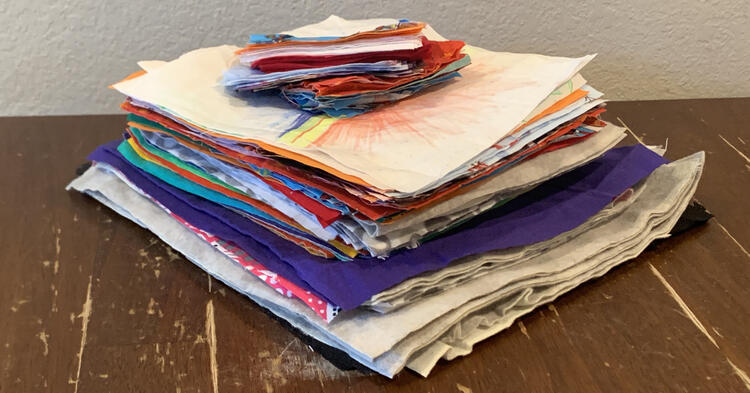
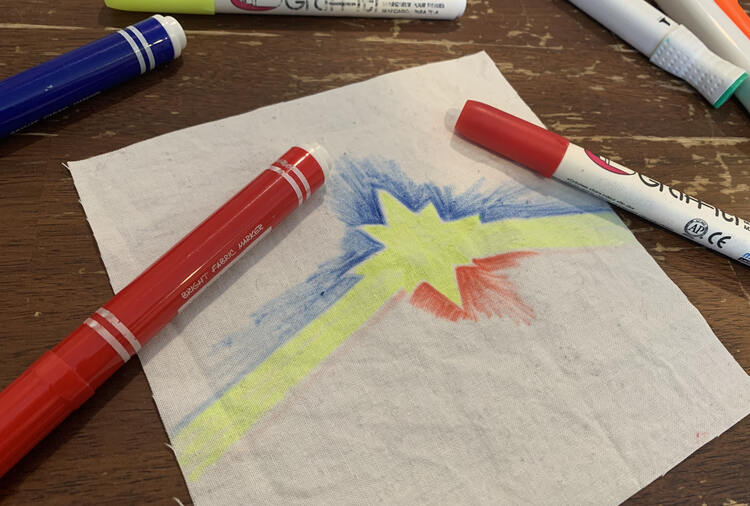
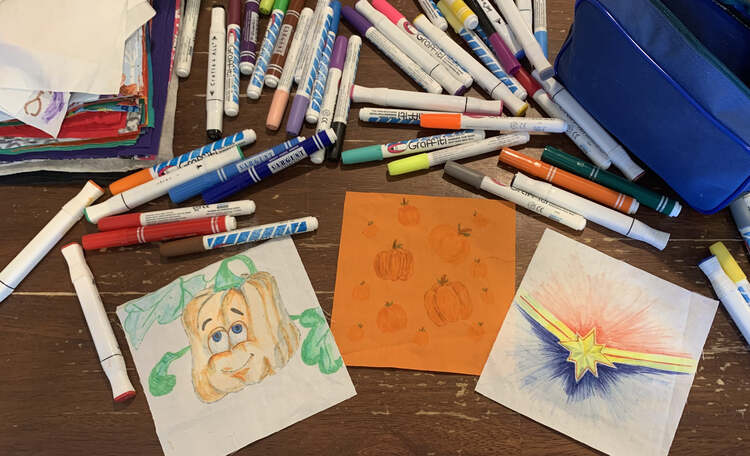
Once the mask fabric was cut it was time for the kids to decide which ones they wanted. I laid out all of the mask fronts on the kitchen table alongside the rectangles of fabric for the edge of the mask. Even though I had kept track of how many rectangles and masks I cut they didn’t fully match up so there ended up being some mismatched pairings. As such I had the girls take turns picking a mask front and two matching rectangles so they could decide how each individual mask might look. I then gave them a couple days to decorate the fabric pieces any way they’d want. Ada had requested a white mask, for this purpose, so she got busy decorating it right away along with some other masks and their matching rectangles. Zoey had been decorating something else around this time so she decided to skip the mask decorating and ended up with a plain orange mask, a plain red one, and several printed ones instead.
With each mask front paired up with two rectangles of fabric and the flannel backing it was time to sew them all up. I ended up doing this assembly line style so it would, overall, be quicker as there’d be less back and forth between the kitchen (marking, clipping, and pressing) and the office (serging and sewing). I actually ran out of sewing clips and had to split the masks into two sets at a couple points so I could free up some clips for the next group before continuing on. I hopped onto Amazon at one point to buy more even though I finished the masks before they could arrive. Next time (hopefully not with masks) I will be better prepared for any large batch of sewing projects.
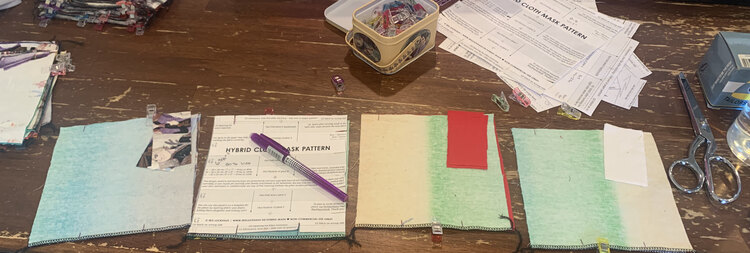
After finally sewing up all the masks it was time to add the elastic. For our previous masks we chose to go with a single length of elastic that was threaded through either sides resulting in two loops that both go around the head and keep the mask secured. This style is handy as you can wear the mask around your neck when heading somewhere, for instance driving to your location or between crowds while walking outside, and then can quickly pull it up to cover your face when you get to where you’re going. Over the summer I actually got in the habit of putting it on the girls like a necklace when we headed out the door and, once we arrived via car, they could easily pull it up themselves and this way we never lost one.
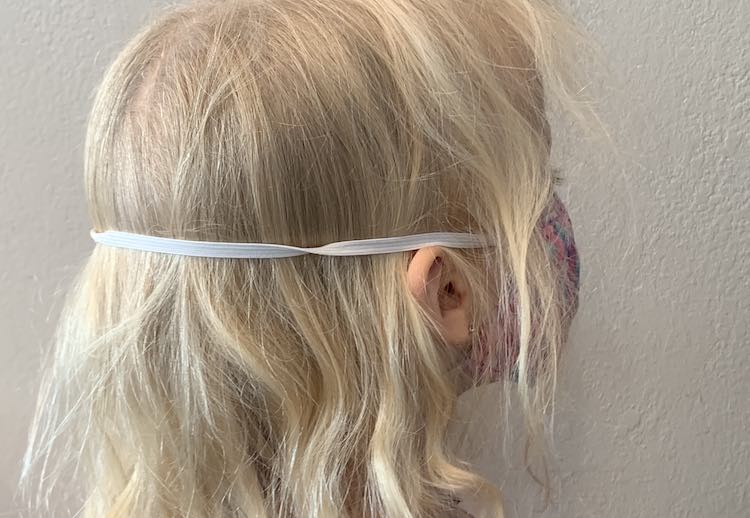
Since there were so many masks and the length of the elastic needed could change as the girls have grown since the last time I made masks I decided to change up my method this time around. Previously I’d threaded the mask while leaving the elastic on the spool before trying it on the person that the mask was for. Once I figured out how tight it should be I’d cut the excess elastic off, tie it up, and go on to thread the next mask. This time around I knew no one had the patience for that so instead I measured the elastic, that may have been stretched out, on each person’s favorite mask to determine how long the elastic might be that they’d need. I then cut one piece of elastic for each person and used it to thread a single mask for them to try on. Once everyone confirmed the mask indeed fit I went through and cut out all the elastic I needed, sat down with a show after the kids went to bed, and threaded the rest of the masks. Previously this was the worst step when making masks but this time around, with the new Schmigadoon! show on Apple TV, it wasn’t too bad.
In case you’re doing the same I ended up cutting Zoey’s elastic 21 inches long, Ada’s 22 inches, mine 32.5 inches, and Matt’s 34.5 inches long. I also grabbed an old container insert the kids had been using for sensory play so I could separate each length of elastic and keep track on whose elastic was whose more easily. When I threaded the masks I did each person’s batch of masks at once before going onto the next person’s masks so there would be no confusion.
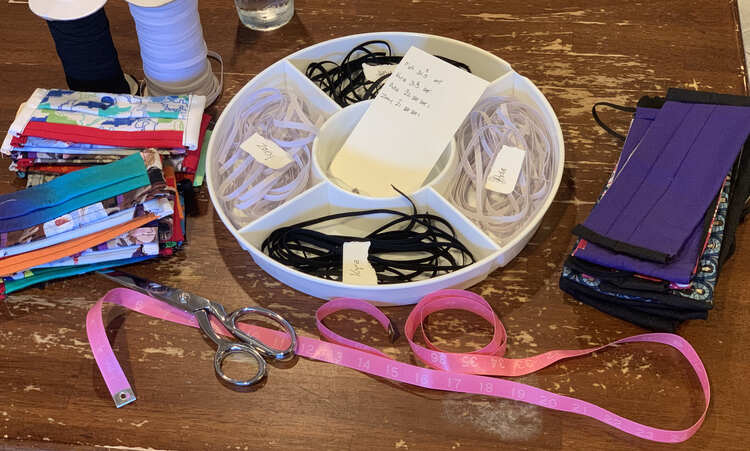
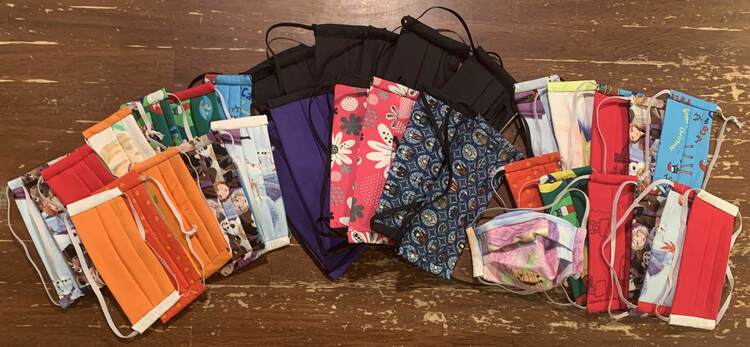
While the kids had the option to color their masks I spent the time cutting the fabric needed for the zippered and drawstring pouches meant to hold their clean and dirtied masks in their backpacks. Thus their coloring of the pouches and the sewing of the bags overlapped with the masks a bit. To make this simpler I’m going to first go over the zippered pouches and then the drawstring ones. That said some photos may show the other item in the background.
Clean Mask Bags – Zippered Pouches
Two years ago, when first making a zippered pouch using Crazy Little Projects’ free pattern, I was making Ada a pencil pouch for her school supplies. At the time I cut all four rectangles out in white so she could decorate the outside of the pouch, before I sewed it together, while Zoey and I could decorate the inside so Ada could have a part of her family with her when she was at school and may miss us. The interior and exterior of this pouch is composed of two pieces of fabric so Zoey decorated one while I wrote a message from Matt and I saying we loved Ada on the other side. Although Ada ended up not needing a pencil pouch, converting it into a snack/lunch bag, I loved that idea and so, this year, I decided to do the same with their clean mask bags.
I knew either girl probably only needs one zippered pouch but then I wondered what would happen if I needed to wash the masks when the girls were going to be in school and so decided to make them each two. This way I can have the girls switch to the other zippered pouch, once or twice a week, when I wash the masks and it doesn’t matter if these events happen midweek or on the weekend.
I started out with this project by pulling out my zipper stash, from a three pound mystery bag of zippers I purchased through ZipperStop back in 2019, and had the girls each choose two of their favorites ones. The pattern itself is made for a nine inch long zipper and has you cut out the four rectangles to be 9.5 by 5.5 inches large. As such I realized I’d need to measure each of the zippers the girls had chosen and recalculate the dimensions of the fabric I’d need to cut.
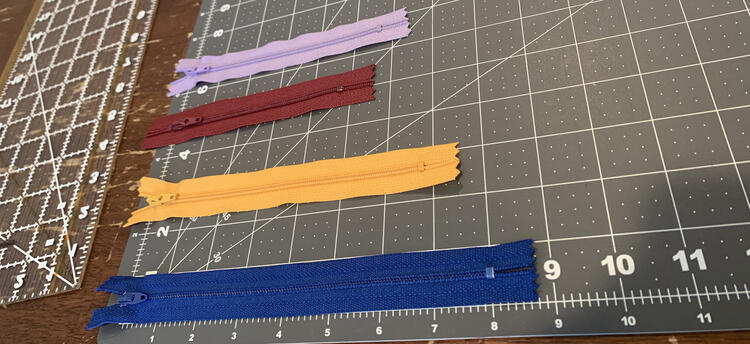
I knew I could easily adjust the 9.5 inch long side to be half an inch longer than the zipper size but if I stopped there all the pouches would be different sizes. Instead I decided to adjust the other side in relation to the zippered one. As each of the zippers were smaller than nine inches long this meant that each of the zippered sides became smaller and measured at:
zipper length + 1/2" and in relation the other side’s length became longer and measured in at the size difference between the zippered side plus 5.5 inches of the original pattern. Specifically:
9.5" - (zipper length + 1/2") + 5.5"If you’re doing the same I figured I’d list the final dimensions I used for each of the four bags. Just know that the fabric dimensions might change the direction of the final bag so if you color the fabric first or are cutting from dimensional fabric you may want to confirm which way you want it first. For me three of the final four bags appears sideways from what I expected yet the kids are the happy with the result so it works.
- Lavender: 5.75″ long zipper – fabric was cut 6.25 by 8.75 inches: (9.5-(5.75+.5)+5.5)
- Burgundy: 4.75” long zipper – fabric was cut 5.25 by 9.75 inches
- Blue: 8” long zipper – fabric was cut 8.5 by 6.5 inches
- Yellow-orange: 6.75” long zipper – fabric was cut 7.25 by 8.25 inches
Once I knew the size of the fabric I needed it was time to cut it out. Ada wanted both her bags to be white, to make it easier to color, while Zoey chose to have the blue zippered bag be orange and the other one be white like Ada’s.
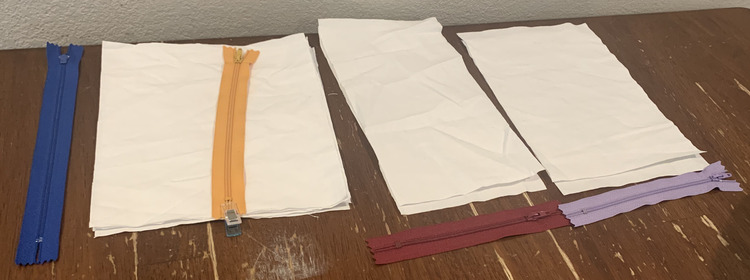
With the fabric cut out I took one rectangle from each pile and wrote a message saying that we loved them and decorated it with hearts. I then took another piece of fabric and wrote out Name's Clean Masks on it so the bag would be properly labeled. When the girls were ready to color I gave each of them two pieces of fabric, one of which was labelled, from each of their bags and one piece of blank fabric from their sister’s bags. This way they could decorate the outside of each of their bags however they wanted and then write or draw a message to their sister for inside their sister’s bags. Specifically, assuming we’re talking about one of Ada’s bags:
- I took piece 1 and wrote Ada’s Clean Mask Bag and gave it to Ada to decorate.
- I left piece 2 plain and gave it to Ada to decorate.
- Pieces 1 and 2, ideally, become the outside of the bag.
- I then wrote a message from Matt and I on piece 3 and decorated it with hearts for Ada
- I left piece 4 blank and gave it to Zoey to decorate for Ada’s bag.
- Piece 3 and 4 were meant to become the inside of the bag that Ada would see when switching masks.
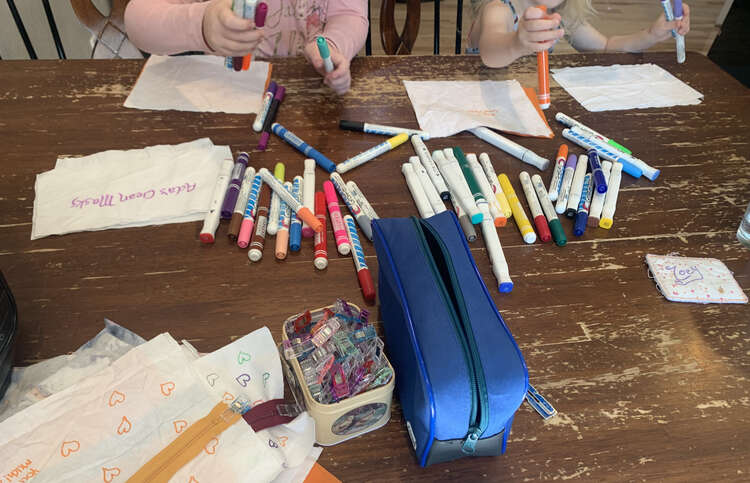
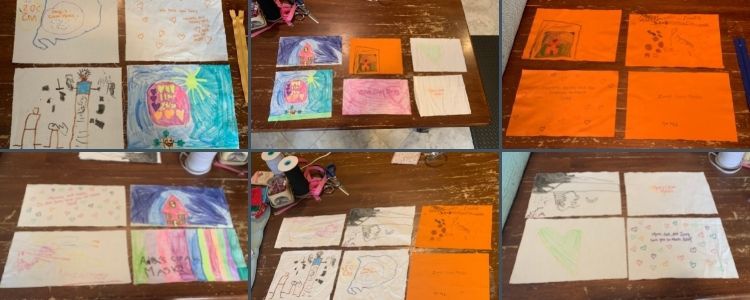
While coloring Ada had decided to change up the plan by moving one of the inner pieces to the outside of the bag and an outer one to the inner. As such, after pressing each one to set the ink, I made sure to confirm with each girl which pieces should be on the outside and which should be on the inside before sewing them to the zipper. Once finalized I was able to sew up the rest of the bags on my own with no needed input from them. The only difficulty in this project came when sewing over the zipper ends as I chose to serge the edge and although I was careful not to run the metal part of the zipper through my blade I did break a needle when going over a zipper. After that I was much more careful and used my sewing machine first on many of the zipper ends, carefully, before serging over the bags’ ends making sure to move further away from the zipper ends on some of them with my serger.
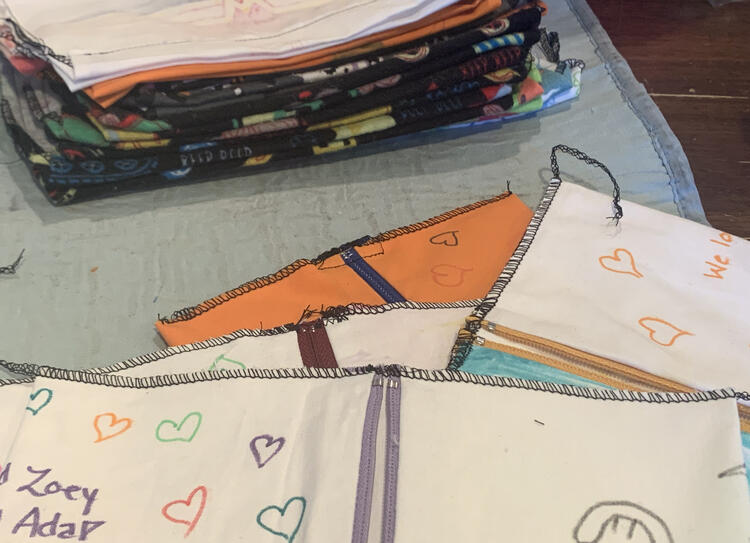
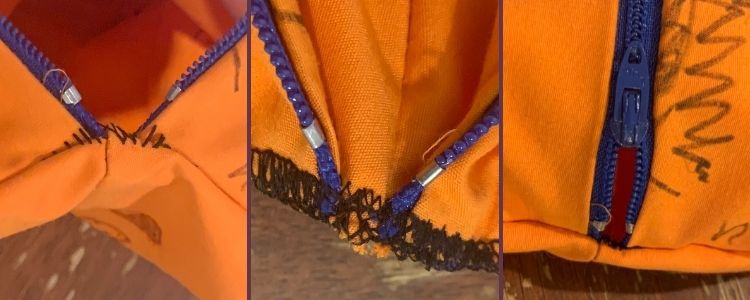
After sewing all of the pouches closed, with the zipper partially open to give it space to turn right side out, the final step was to sew the corners in for a box corner. I had started out tying off my serger tails before realizing that it didn’t matter here and then clipped and marked each corner. I then sewed each of the box corners using my sewing machine so I still had to trim the excess fabric off but I didn’t need to tie off any more of the serger tails.
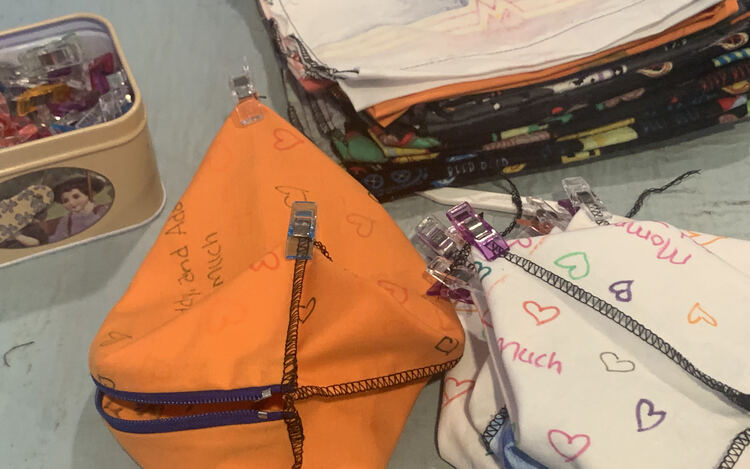
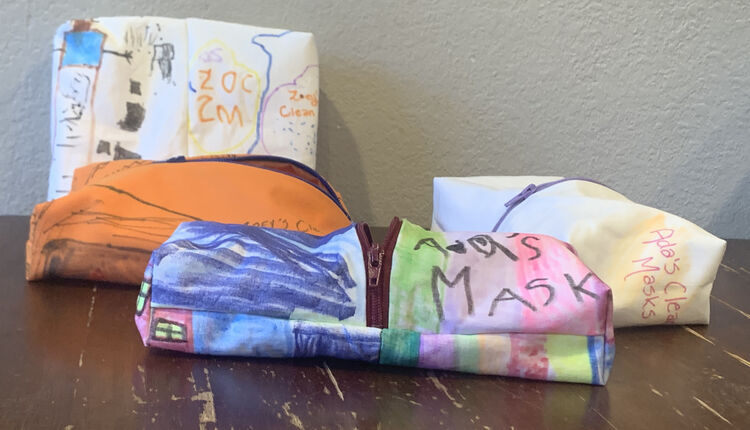
And now with the masks and zippered pouches explained let’s go onto the dirty mask bags.
Dirty Mask Bags – Cinched Top Pouches
For the pouches containing any dirtied masks I knew they’d need to be washed more often. As such I knew I’d want to make more of them, so I didn’t need to launder them right away, and thus wanted to use a simpler pattern. I decided to go with a cinched bag and looked online for a simple pattern I could use. I came across How to Sew a Simply Drawstring Pouch by Pam Ash Designs and it was exactly what I wanted. I used the dimensions listed on the site and the only major deviation I made was switching to my serger to serge the top of my bags’ edges rather than folding and sewing the raw edge down before making the ribbon channel.
As I had currently made twelve masks for each girl and they already had four masks each I decided to assume I’d be washing the masks once a week when calculating just how many dirty mask bags I’d need to make. Thus assuming they needed one bag for each day at school I chose to make ten bags in all so each girl would have five each. I decided to make a plain one for each of them that I could decorate and then use my fabric scraps to make the rest. While cutting the 8 by 8 inch fabric squares I ended up making a couple more as why not?
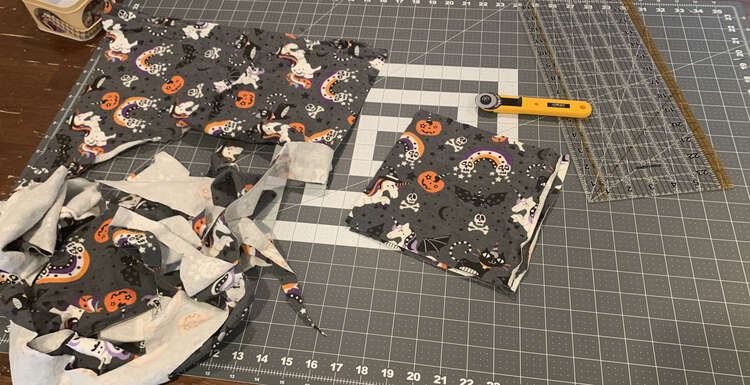
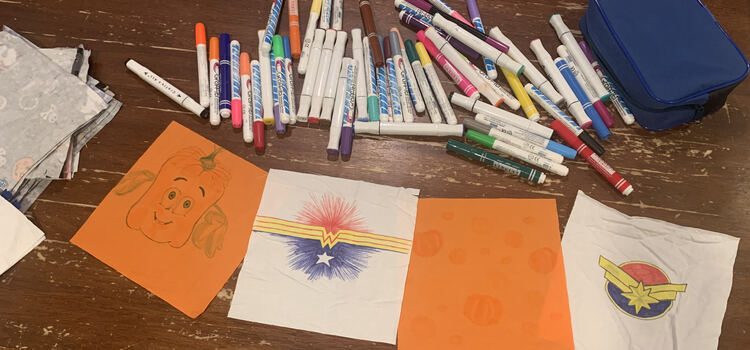
Once the fabric was cut and the four colored fabric squares were pressed to set the ink it was time to sew up the bags. This is where I deviated from the sewing pattern. The website has you mark two inches from the top, sew up the sides and bottom of the bag up to that mark, fold the tops over at an angle and sew the fold down, and then finally create the channel for the ribbon. I decided I wanted to serge the edge so I know it won’t unravel and then have the fold in the channel creation keep the angled fold in place rather than by using my sewing machine. As such I serged the top of either side of each fabric square first, placed each bag square together with right sides facing in, marked two inches from the top, and then sewed the sides and bottom closed. Then, before sewing the channel, I angled the edges in and clipped them in place rather than sewing them down like on the website.
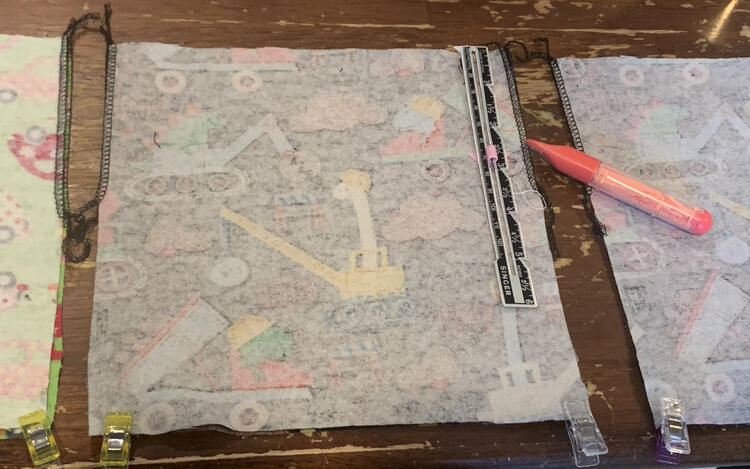
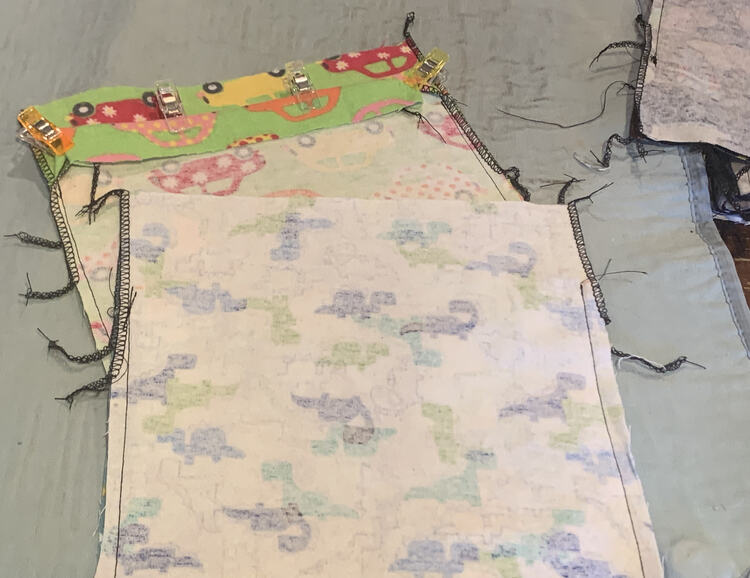
Once the sewing was finished I trimmed the serger tails rather than carefully tying them off like I normally do as I was getting a bit lazy and I hoped the sewn ribbon channel would keep it in place well enough. I guess we’ll see as time goes on. Now all I needed to do was add two loops of ribbon through the entire channel. I grabbed my container of ribbons, the stack of sewn bags, a chopstick to help turn out the bottom corners, scissors, and a safety pin to help pull the ribbon through the bags’ channel. I got comfy, turned on a show, and proceeded to thread two loops of ribbon through the tops of each bag using a knot to keep the ends together.
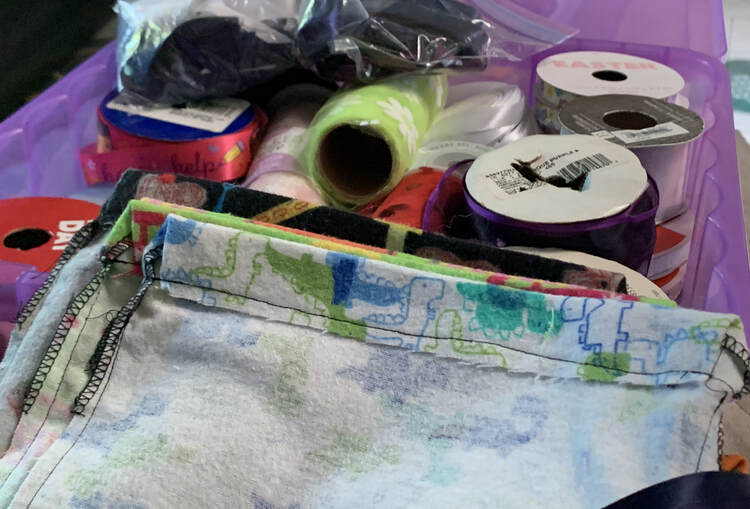
And with that the bags were finished and looking great! I’m so glad I was able to sew up the masks, zippered bags, and ribbon cinched pouches in time for school to start. With all the new masks and bags; however, the old mask storage solution doesn’t work anymore…. so here’s what I’ve done so far.
Mask Storage
When I first started sewing masks for us there weren’t a lot of them so I easily tossed them all into a plastic Dollar Tree basket, placed up on a cabinet by our front door, and we simply grabbed what we needed on the way out the door. By the end of 2020 that organizational solution wasn’t working anymore. At that time I had tried three different face masks patterns and we all had our own favorite masks and less favored ones. As such I decided to move the masks we didn’t like as much out of the way to a smaller basket, so they wouldn’t be in the way, and I then upcycled a cereal box to keep our masks, mostly, separated and easier to grab.
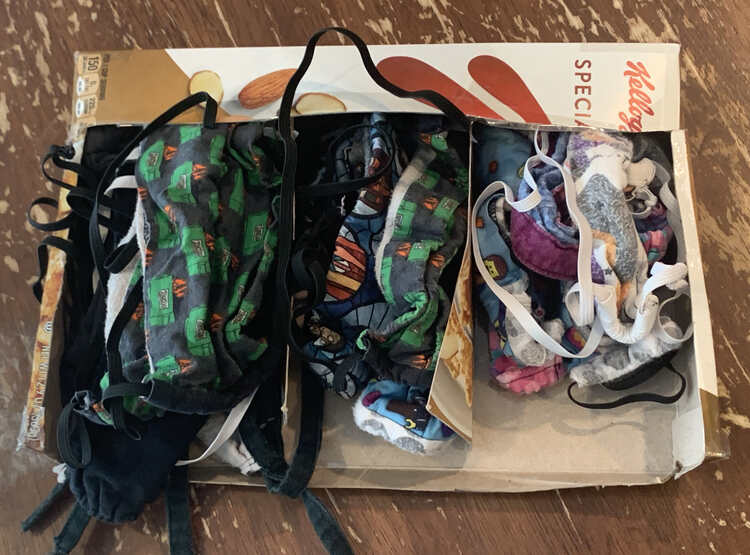
With all these new masks just made I knew I needed to find a new organizational system. Earlier, the week before, I had visited the local Dollar Tree and found some cute desk organizers in the perfect colors for my girls. I knew, with pink and orange, I needed to have them and justified it by imaging them on the girls’ art table with all their favorite art supplies inside. I hadn’t shown them to the girls yet so I was easily able to pivot that idea into mask organizers. The organizer came with one large pocket, perfect for the masks, and two smaller pockets that worked great for the zippered bag(s) in one and the ribbon cinched bags in the other. This did mean the cinched bags had to be split up between the girls but I got around it by having them take turns picking what they wanted until all the bags were divided up. After laundering them I may do the same or just divide them up myself depending how it goes. We’ll see how this system works long term but I love how adorable it looks now.
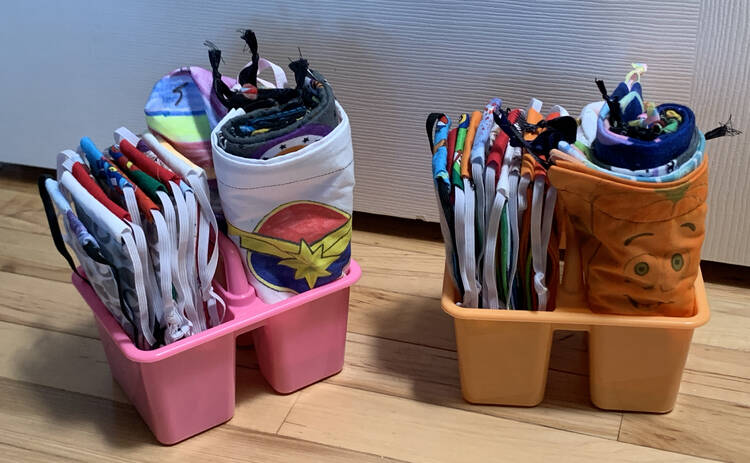
After figuring out how to organize the kids’ masks it seemed silly to keep using the old upcycled organizer so I tossed it into the recycling. I considered upcycling another cereal box for Matt and I but the recycling had recently gone out and there wasn’t a lot of potential options. I then remembered an old baby wipe container that the girls had been using as a stamp storage in their art caddy that they no longer needed. I grabbed that and placed our masks inside with Matt’s at one end and mine at the other. So far Matt has tried twice to grab one of my masks when we’re in a hurry but over time we might get used to the new container… or come up with something better.
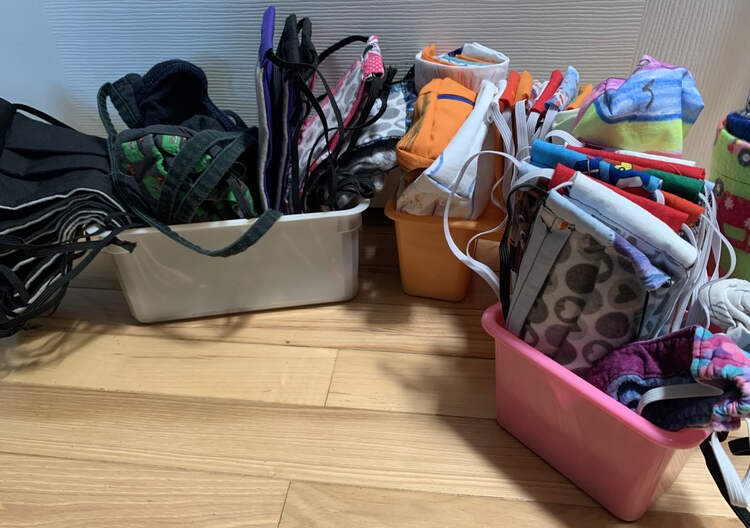
At the time of writing this the girls have only been in school for two half days so Zoey has only used two masks in total while Ada changed masks partway through the day so she ended up using one ribbon cinched bag and two masks each day. So far I’m happy with how I estimated my numbers.
Also, so far, the kids’ mask containers have been sitting in our living room. I don’t like their current location but do like how they’re accessible for the girls to use without me needing to pull something down from up high. I’ve been having them set out their masks the night before so I may just move the mask containers to their bedroom once I find a good place for them in there.
Are you sewing up masks for your kids as they go back to school? Are you looking into using a clean or dirty mask bag for your kids or yourself? I’d love to hear if this post helped you out in anyway so feel free to share in the comments below. I hope this post finds you well and you’re having a good day.
If you’re interested in getting any of my future blog updates I currently come out with a new one every Wednesday and share them to my Facebook page and Instagram account. You’re also more than welcome to join my email list located right under the search bar or underneath this post.
Did this save you time?
